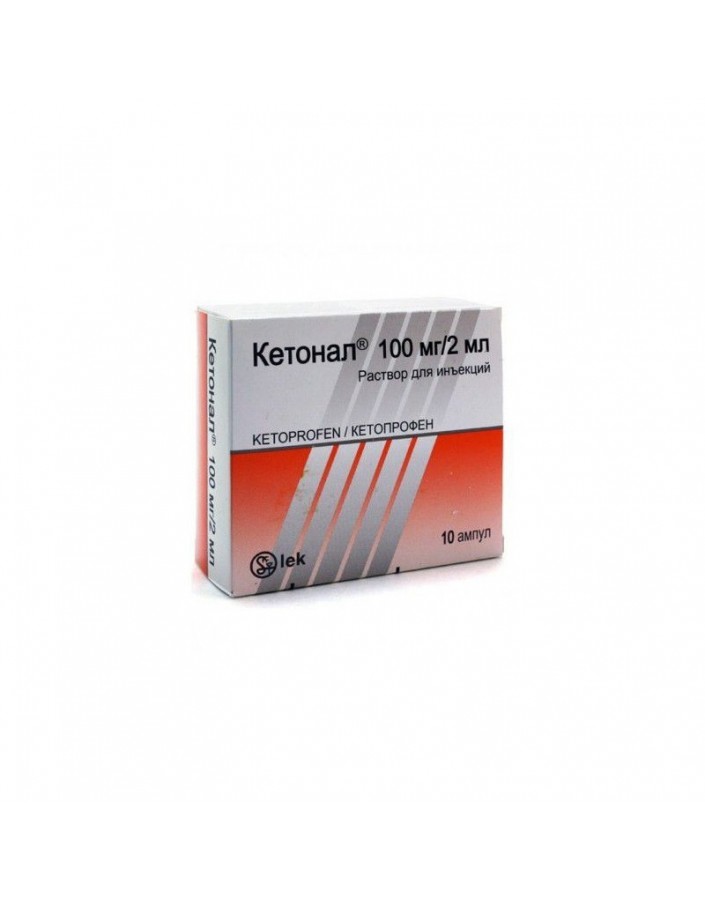




Security policy (edit with Customer reassurance module)

Delivery policy (edit with Customer reassurance module)

Return policy (edit with Customer reassurance module)
It has an analgesic, anti-inflammatory and antipyretic effect.
The mechanism of action is associated with inhibition of prostaglandin synthesis at the level of cyclooxygenase.
In addition, Ketoprofen inhibits lipo-oxygenase, has anti-bradykinin activity, stabilizes lysosomal membranes, and causes significant inhibition of neutrophil activity in patients with rheumatoid arthritis.
The use of Ketonala in the third trimester of pregnancy is contraindicated.
The use of Ketonal in the I and II trimesters of pregnancy is possible only in the case when the potential benefit to the mother exceeds the risk to the fetus.
If necessary, use Ketonala during lactation should decide on the termination of breastfeeding.
With prolonged use of Ketonal, as well as other NSAIDs, regular monitoring of hematological parameters, indicators of liver function and kidney function, especially in elderly patients, is required.
Ketoprofen should be carefully prescribed to patients with hypertension and heart disease, accompanied by fluid retention in the body, it is recommended to monitor blood pressure.
Ketonal can mask the symptoms of infectious diseases.
In connection with the photosensitivity of the drug vials with an infusion solution should be wrapped in dark paper or foil.
There are no data on the negative effect of Ketonal in recommended doses on the ability to drive a car and work with machinery. However, when using the drug, care should be taken to persons whose activities require quick psychomotor reactions (driving a car, working with mechanisms).
1 ml of solution for in / in and in / m introduction contains: Ketoprofen 50 mg.
Excipients: propylene glycol, ethanol, benzyl alcohol, sodium hydroxide, water d / u.
The solution is injected in / m or / in.
V / m administered 100 mg 1-2 times / day.
In / in the infusion of ketoprofen carried out only in a hospital.
A short intravenous infusion: 100-200 mg, diluted in 100 ml of a 0.9% solution of sodium chloride, is administered within 0.5-1 hours. It is possible to reintroduce after 8 hours.
Prolonged intravenous infusion: 100–200 mg, diluted in 500 ml of infusion solution (0.9% sodium chloride solution, Ringer’s lactate-containing solution, 5% dextrose solution) are administered within 8 hours. Re-administration after 8 hours is possible.
The maximum daily dose (including the use of various dosage forms) is 200 mg.
Allergic reactions: common - skin reactions (itching, urticaria); not common - rhinitis, shortness of breath, bronchospasm, angioedema, anaphylactoid reactions.
Digestive system: common - dyspepsia (nausea, diarrhea or constipation, flatulence, vomiting, decreased or increased appetite), abdominal pain, stomatitis, dry mouth, not common (with prolonged use in large doses) - ulceration of the gastrointestinal mucosa, impaired liver function; rare - perforation of the digestive tract, exacerbation of Crohn's disease, melena, Gastrointestinal bleeding.
CNS: common - headache, dizziness, sleep disturbance, fatigue, nervousness, nightmares; rare - migraine, peripheral polyneuropathy; very rare - hallucinations, disorientation and speech disorder.
Sense organs: rare - tinnitus, change in taste, blurred vision, conjunctivitis.
SSS: not common - tachycardia, arterial hypertension, peripheral edema.
Urinary system: rare - impaired renal function, interstitial nephritis, nephrotic syndrome, hematuria (often develop in people who take NSAIDs for a long time and diuretics).
Other: rare - hemoptysis, menometorrhagia.
Laboratory values: ketoprofen reduces platelet aggregation; transient increase in the level of liver enzymes; rare - anemia, thrombocytopenia, agranulocytosis, purpura.
Symptoms: nausea, vomiting, abdominal pain, vomiting with blood, melena, impaired consciousness, respiratory depression, convulsions, impaired renal function, renal failure.
Treatment: gastric lavage, the appointment of activated charcoal, spend symptomatic therapy.
The use of histamine H 2 receptor blockers, proton pump inhibitors, and prostaglandin inhibitors has been shown. There is no specific antidote.
The drug should be stored at a temperature not higher than 25 ° C